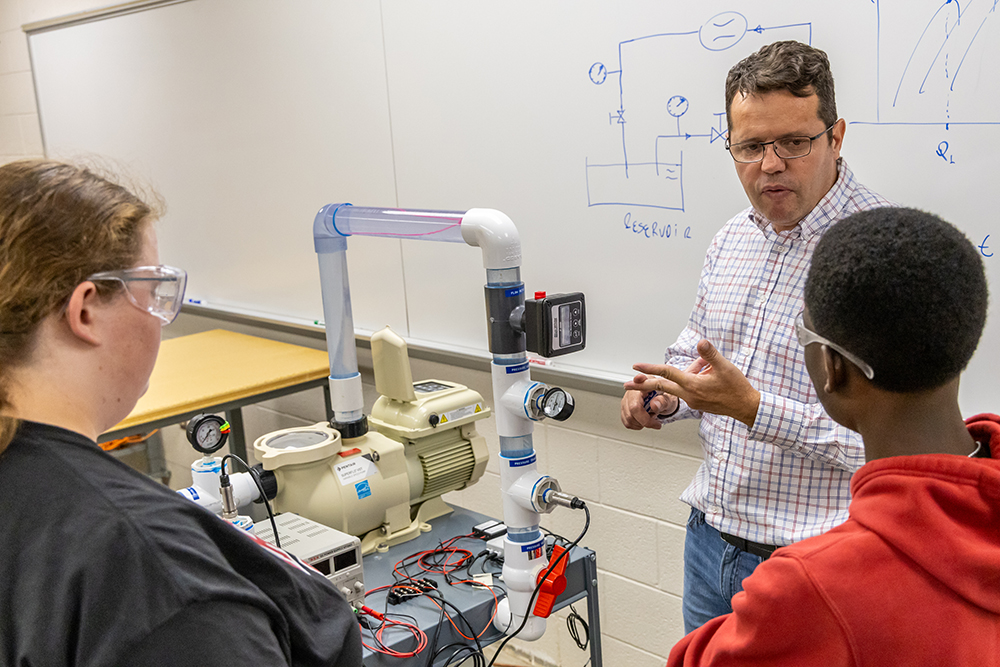Bridgewater College is known for providing an atmosphere that fosters growth and self-discovery among its students, particularly in helping them forge clear career paths through a combination of academic and extracurricular opportunities. As a liberal arts institution, the College’s values of critical-thinking, collaborative learning, communication and community-building are at the forefront of every program. And Bridgewater’s nimbleness as a small college allows it to incorporate new programs based on student interest and desired career outcomes.
STEM (often taught as STEAM to include the arts) education, a focus on science, technology, engineering and mathematics, has seen a rise in popularity at the K-12 level and beyond—and for good reason. The U.S. Department of Labor and Statistics estimates a 10.8% increase from 2022 to 2032 in the number of people employed in the STEM field. In addition, a Payscale.com survey of the highest starting median salaries for college graduates with bachelor’s degrees lists engineering concentrations as eight of the 10 highest-paying majors. As the world continues to advance in scientific and technology discoveries, engineers are at the forefront.
“Our world is full of exciting developments that push the boundaries of knowledge and science, from the James Webb Space Telescope to self-driving cars to rovers that explore Mars. Our students are passionate about going into innovative industries that allow them to be part of these human achievements,” says Associate Professor of Physics and Department Chair Dr. Deva O’Neil.
Over the last five years, the field of engineering has consistently been named among the top four career objectives by students admitted to Bridgewater College. The new undergraduate major in engineering allows students to graduate with the skills necessary for the fields of mechanical engineering, automation engineering and mechatronics, nuclear engineering, aerospace engineering and automotive design. The engineering program welcomed a cohort of 27 students this fall.
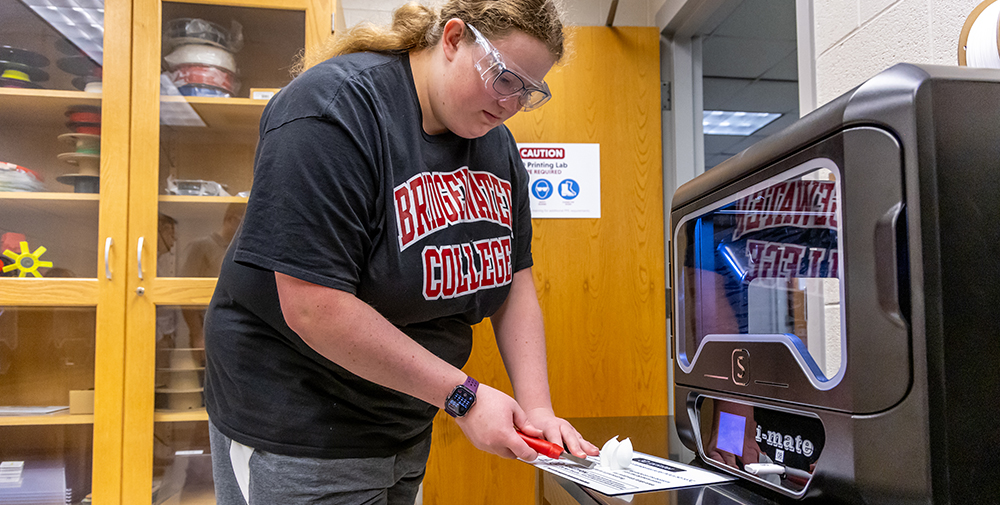
This summer and early fall, Bridgewater overhauled its physics labs to better align with the engineering major needs, including an upgraded computer lab (now a design lab), a 3D printing lab, a mechatronics lab, fabrication lab and prototyping lab. The major adds upper-level courses, including lab experiences, in materials, mechanical design, mechatronics and other areas not formerly offered. The Department of Engineering and Physics specializes in project-based learning that fosters hands-on skills and problem-solving.
One of the first assignments this fall in Assistant Professor of Engineering Dr. Derli Amaral’s Foundations of Engineering 101 class mimicked a real-world manufacturing assignment. Students used a computer program called SolidWorks to design a float that rises with the level of gas in a fuel tank to indicate how full the tank is. Once designed, students printed the part in the 3D printer lab. After the part was complete, they had to inspect it, measure its dimensions and weigh it to determine if any adjustments were needed.
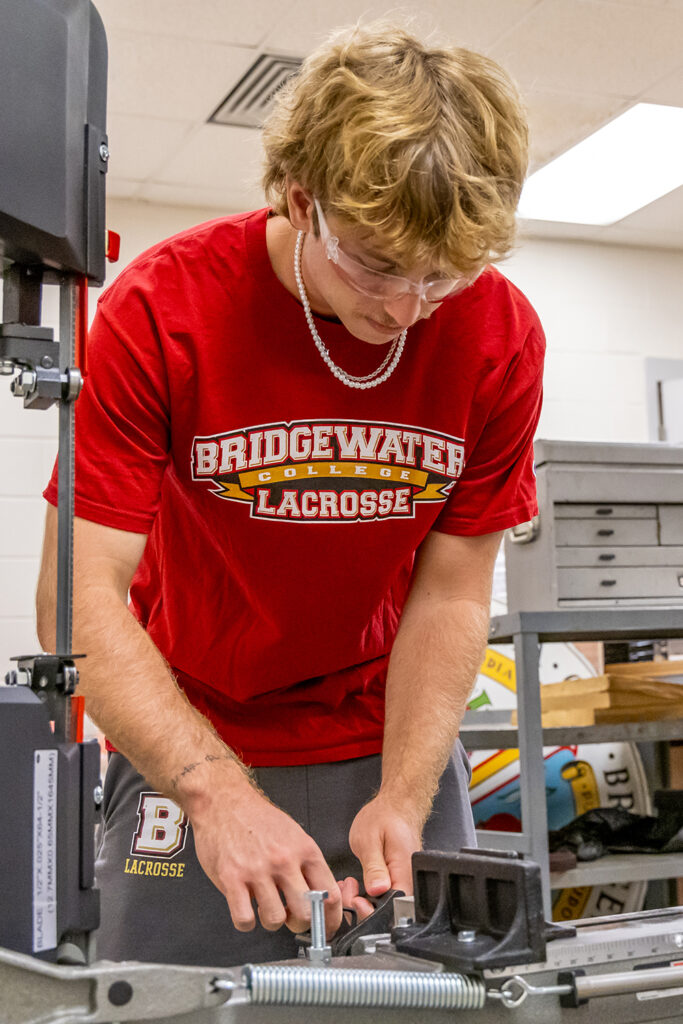
In the world of engineering, 3D printing is a great way to prototype something quickly that you otherwise couldn’t manufacture. For instance, you can scale down a turbine that might cost millions of dollars to manufacture and print a smaller replica to test dimensions in a couple of hours with $20 of plastic. The float-making assignment adds another dimension to learning, says engineering major Isaac Quattro ’27, because it allows students to apply what they’ve learned in class and assess their knowledge in a scenario that they’ll likely come across in their future careers.
“It’s one thing looking at it on a computer but to actually see it produced…it’s a feeling you don’t get from a lot of other classes. It’s not just numbers on a page,” Quattro says. “You have a purpose, and you can really apply what you know to solve a problem. That’s super engaging.”
Quattro knew he wanted to major in engineering as a high-schooler (he’d always enjoyed physics classes and building things with his hands), but he had another requirement for college: to play lacrosse. He was part of the first cohort of lacrosse players at his high school in Aiken, S.C., and knew he wanted to continue playing the fast-paced game at the collegiate level. Bridgewater’s Head Lacrosse Coach Mic Grant was the one to tell Quattro about the new engineering program at BC, which cemented his decision.
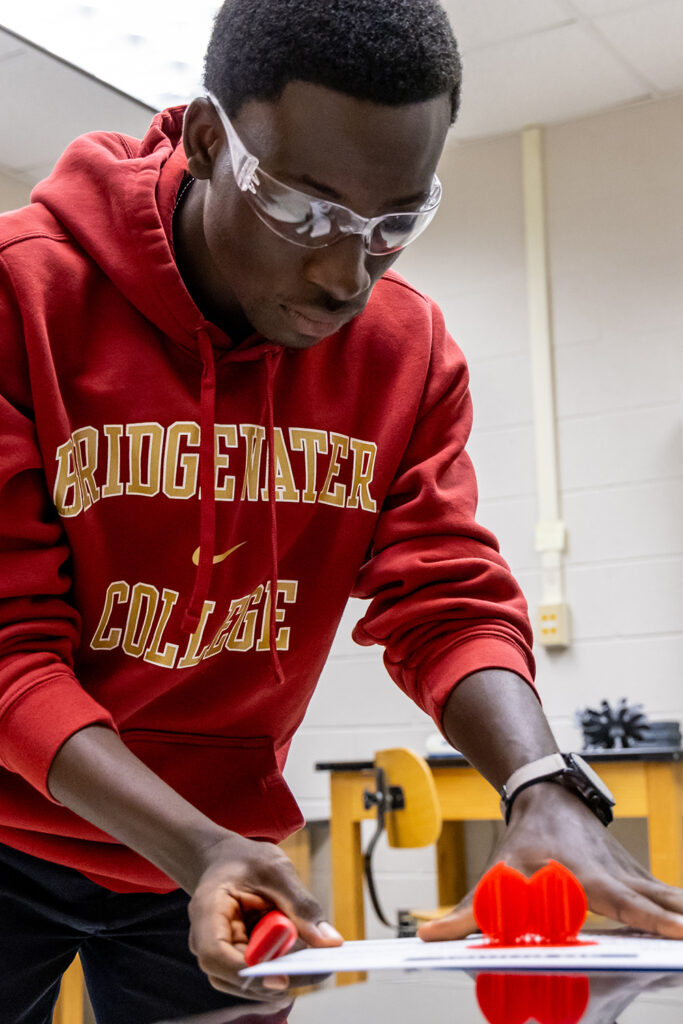
First-year engineering major Isaac Plange’s interest in aerospace engineering began with watching televised NASA rocket launches as a kid in his hometown of Takoradi, Ghana. When it came time to research college options, he knew he wanted to study in the U.S., which he calls “an engineering powerhouse.” His search led him to Bridgewater and its recently launched engineering program.
Since arriving on campus, Plange says he’s enjoyed the friendly, small-college atmosphere. He loves the opportunity to design, build and assess his own work in the various engineering labs and says it’s empowering to know you can not only build something but also make it better by continuing to tweak its design. After college, he plans to return to Ghana to pursue an engineering career.
“I’ve always wanted to be somebody who develops things to make life better for people,” Plange says.
Bridgewater’s approach of educating the whole person means science-oriented students graduate career-ready with both the hard and soft skills necessary to be successful employees and engaged citizens. Many engineering programs focus on the technical knowledge needed for post-graduation jobs, but the creative thinking learned in an art class or the inquisitiveness needed in a philosophy course to look at problems from all angles produces well-rounded students who can not only solve problems but also know the value of diversity of thought when working with others.
“We teach them all the skills and give them the foundation they need to be successful at their jobs,” Gene Stainback, Bridgewater’s new Engineering Lab Manager, says. “The opportunities here to work as a team, work with an instructor and to really apply theory are so beneficial. It’s not just learning the technology but learning how to work with others. The benefit of a lab system is being part of active learning.”
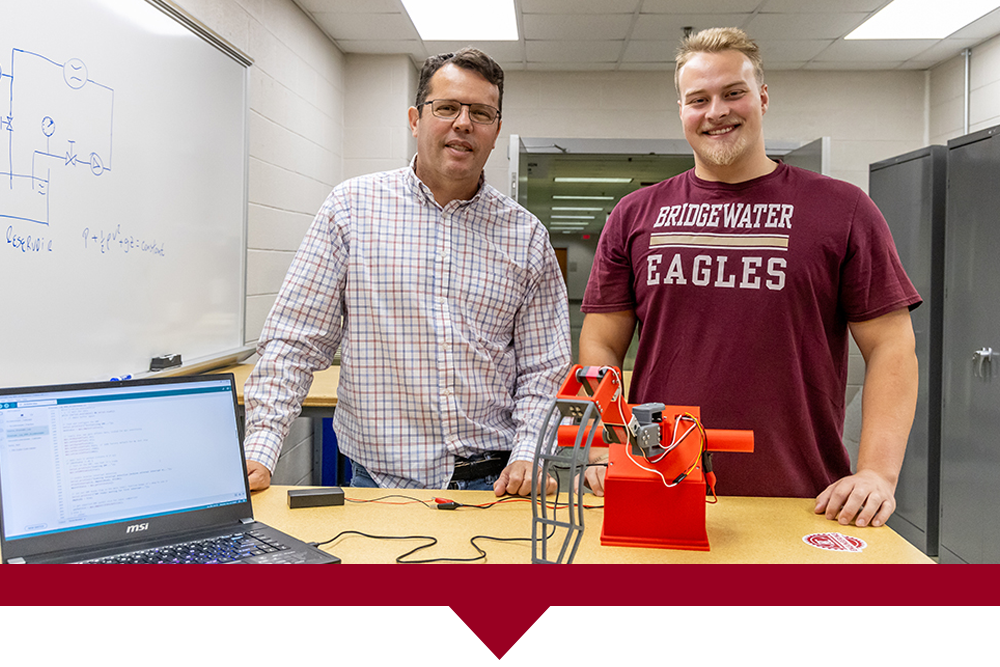
A SUMMER OF CREATION
The mechatronics lab has several shelves that feature past projects of physics students, including a prototype of a Roomba, a robotic arm and the latest project: a self-stabilizing supernumerary leg. Over the summer, engineering major Cameron Martindale ’26 and Amaral partnered on a Dr. John W. Martin Summer Science Research Institute project to create a device that is designed to help those with mobility challenges. The project serves as a great example of a mechatronic system that’s controlled using circuits and electronics, while also bringing in a mechanical engineering aspect. Amaral says he enjoyed teaching as well as learning from Martindale during the collaborative process, and Martindale says the chance to do research as a rising sophomore will be beneficial for the remainder of his academic career at BC and his pursuits after graduation.
– Jessica Luck
